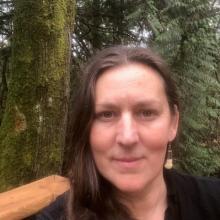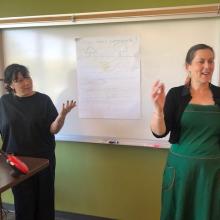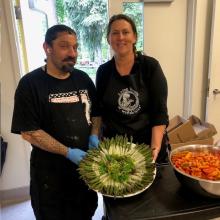Since joining the University of Washington Ph.D. in Geography program in autumn 2020, Natalie Vaughan-Wynn has been deeply involved in research, writing, teaching and collaborations across campus. One of Natalie's doctoral supervisory committee co-chairs (along with Professor Sarah Elwood), Professor Vicky Lawson describes Natalie as "a remarkable, caring and creative scholar and a wonderful human. She is conducting deeply ethical research that foregrounds relations of respect and co-creation with native thinkers/activists and that centers crucial questions about the entanglements of federal food policy and ancestral foodways. Furthermore, both Natalie's research and teaching center questions of food sovereignty in the US. It is a real joy to work with Natalie and to learn from her wisdom, ethics and politics." These commitments have contributed to many accomplishments along the way, and this spring Natalie reflects on these and other achievements just over the horizon. Along with sharing details about publishing an article, helping to organize a symposium, presenting at a conference, and more, here Natalie also offers advice to undergraduates who may be interested graduate school or food geographies.
On co-authoring "Digital food apartheid: The uneven food geographies of Seattle in the era of Amazon" with Professor Jin-Kyu Jung in Environment and Planning F
This paper, published in March 2024, "begins by tracing our food system through the lens of racial capitalism so we can see long-standing entanglements between food, race, and capitalism with newer, digitally mediated food geographies. We see this operationalized in contemporary U.S. government food assistance programs by examining the food stamp program’s evolution from paper (coupons) to plastic (EBT cards) and then to the COVID-era implementation of the Online Grocery Purchase Program (OPP). Theorizing these programs in conversation with Black Digital Geographies scholarship is what I term ‘digital food apartheid,’ a separating apparatus that produces inequalities concerning food that are mediated by, reified through, or materialized from data or digital infrastructure." For more about this research, check out UW Bothell News!
MAPPING A DIGITAL DIVIDE IN FOOD ACCESS
On bringing the Living Breath of wǝɫǝbʔaltxʷ” Indigenous Foods Symposium (May 3-4, 2024) to life
Last year, Natalie attended as a guest and "was blown away by the knowledge and commitment of those who were both engaged in research and accountable to their communities." Now on the planning committee for the event, Natalie comments "Living Breath is a reminder that - though the entanglements between 'the academy' and Indigenous peoples is historied and complex - those of us here who are attentive to these complexities can carve out space that aligns with our commitments as co-learners with our communities… the idea of research with, by, and for, rather than on/about/without. I was already connected to many in attendance, but wanted to deepen that connection. This is what led me to join; I voiced my interest, connections, and capacity to the existing core committee, all of whom I deeply admire, and was welcomed with open arms."
The symposium planning committee "is composed of Indigenous women who represent interdisciplinary academic fields of study and philanthropy in the Northwest Coast; women who are committed to Indigenous food sovereignty and environmental justice, and whose lived and scholarly experiences, personal passions, and academic research are firmly grounded in their homelands and communities." Natalie's participation is described in the following bio:
"Natalie Vaughan-Wynn (Fort Peck Assiniboine Sioux Registered Descendant) is a Ph.D. Candidate in the University of Washington’s Geography Department and is working toward her Certificate in American Indian and Indigenous Studies. Her educational path entails a G.E.D., attending the same college with her mom at the same time, and a graduate degree in Sustainable International Development from Brandeis University.
Work centered on food justice and sovereignty over the last 15 years has brought her to West Africa, where she worked with the Indigenous Hausa people to facilitate village-to-village agricultural knowledge sharing, to Oxfam, as part of a farmworkers’ rights campaign, and to a research institute engaged in international conversations around food and hunger.
Specific ways that food is part of her life include Big Leaf Maple sugaring, foraging and fishing with her husband and son, and frequently shared meals with friends and family."
On preparing a presentation for the Native American and Indigenous Studies Association Conference (June 5-8, 2024)
For this conference, Natalie's project "examines the recent expansion of the legal mechanism known as '638' authority through which Tribal Nations may assert greater self-determination over food-related programs. Six years of legislative advocacy by the Native Farm Bill Coalition has created a pathway within the 2018 Farm Bill for Nations to contract with the USDA to self-administer programs, including the Food Distribution Program on Indian Reservations (FDPIR), a commodity food program relied on by 92,000 Native households. FDPIR 'commods' typically include shelf-stable, preservative-heavy, transportation-tolerant foods destined for (often) rural reservation distribution sites. Currently, 15 pilot programs are reconfiguring FDPIR to suit their specific contexts through inclusion of traditional foods, procurement from Tribal producers and more. Through visits, interviews, and archival research, I add to the growing work that describes how, despite innumerable disruptions to Native foodways, Tribal expressions of food sovereignty can be leveraged through, and outside of, entanglements with federal policy."
Natalie notes that attending the conference "will be especially meaningful to me because one of my mom’s cousins is a former NAISA President. My academic journey, which has felt circuitous at times, feels like it is coming full circle. Of course I’m looking forward to hearing from those engaged with Indigenous-oriented research from all over the world, but I’m also looking forward to the little things, like seeing everyone’s dress and the food (maybe those things aren’t so little after all…). Though we have Sami family friends and an open invitation to join the reindeer herding that happens every summer, we’ve yet to make this happen. I’ve seen the midnight sun (my husband grew up in Alaska) but I have never been as far north as the Arctic Circle… Norway is a first for me!"
Reflections on teaching experience & professional development
"Of the 14 quarters I’ve taught or TA’d so far, half have been through the Program for Writing Across Campus. Megan Callow, the current director of this program, has become a phenomenal mentor of mine. This work, along with my job as a Graduate Peer Tutor in the Odegaard Writing and Research Center (OWRC) and my participation in a Graduate Research Cluster focused on Indigenous Writing Praxis, have given me so many opportunities in terms of professional development. Even more important, the relationships built in these spaces have opened doors for interdisciplinary collaborations. For example, I was first connected to English Ph.D. Candidate and current Humanities Washington Fellow Taiko Aoki-Marcial by Mandy Macklin, the OWRC Director. Taiko and I developed a workshop for the OWRC around decolonial writing strategies for tutors. This evolved into a workshop that we are facilitating for faculty at South, Central, and North Seattle Community College [in May 2024]."
Advice for Future Graduate Students
"I think any advice I have for potential graduate students is the same that I have for life in general. The first bit is from my Mom. She really hammered home the idea that time goes by whether you’re simply working or working towards something. The second is a Hausa proverb. I actually included this in my grad school application and it still rings true for me. It translates to “good relationships depend on feet.” Literally in Hausaland it is customary to begin the day by visiting neighbors. Here, I adapt this wisdom (so, no knocking on doors at 6 a.m.) and instead think of its essence as the idea that regular energy expenditure, even if quotidian, is required in order to be in relation."


